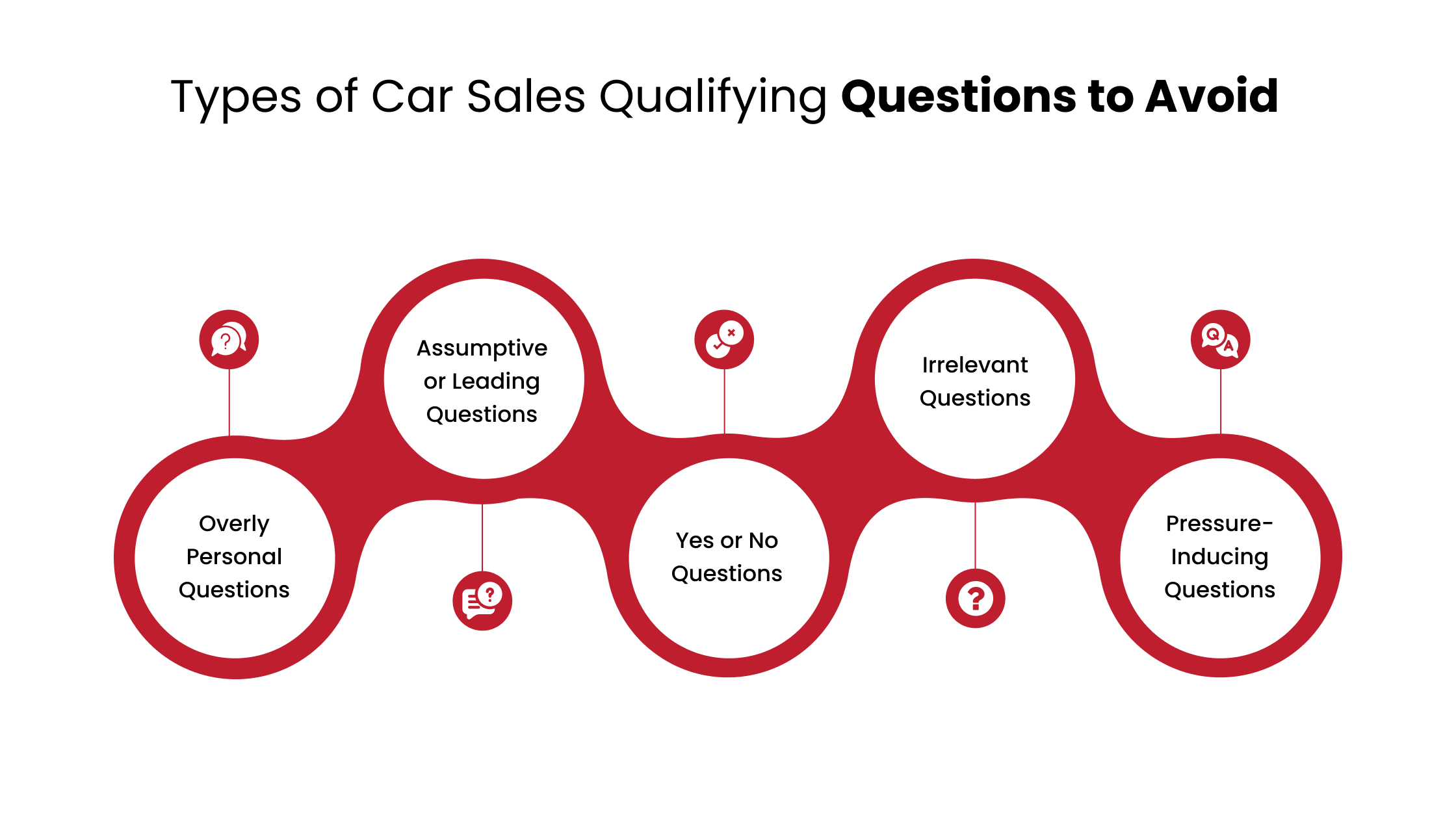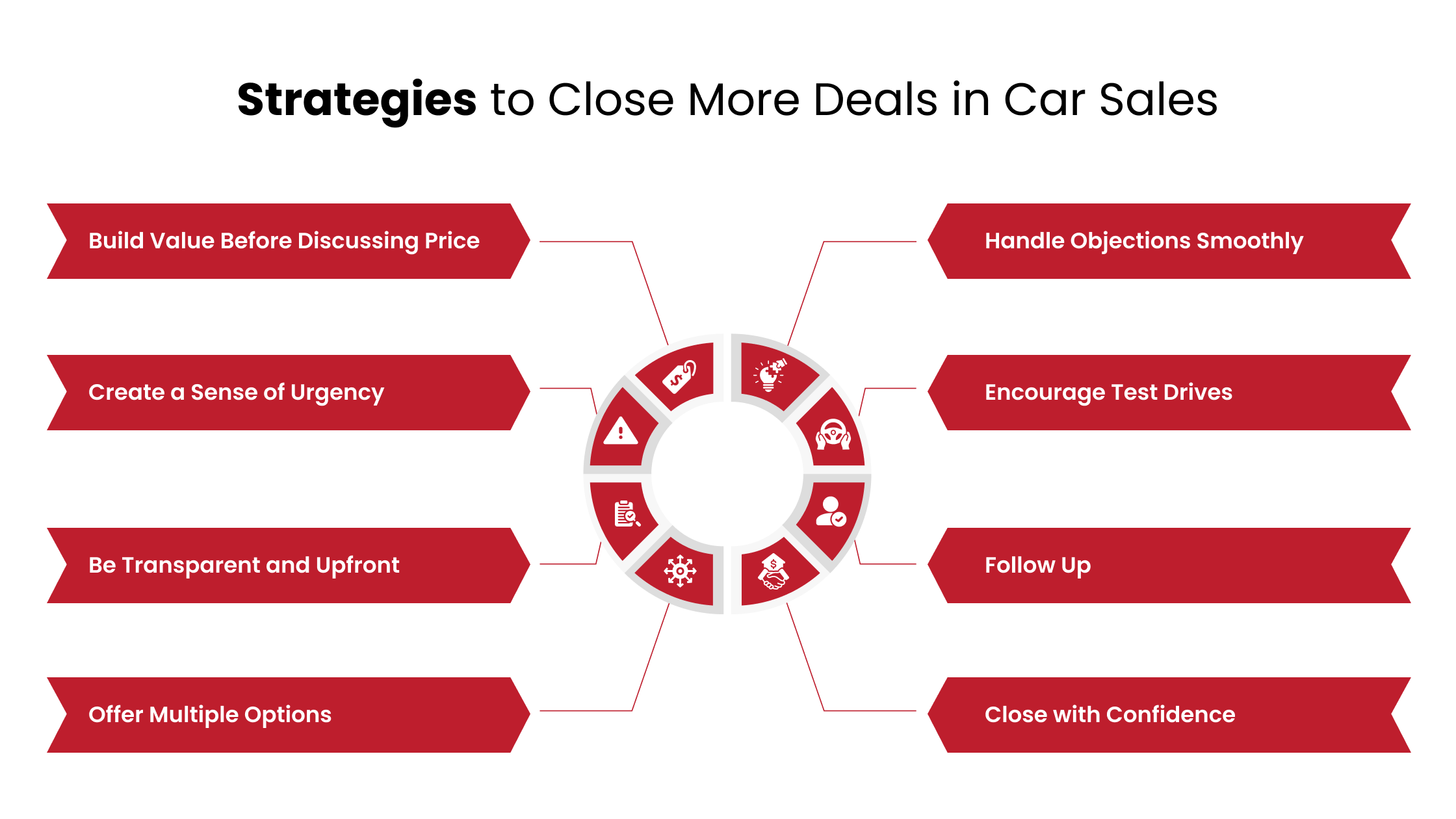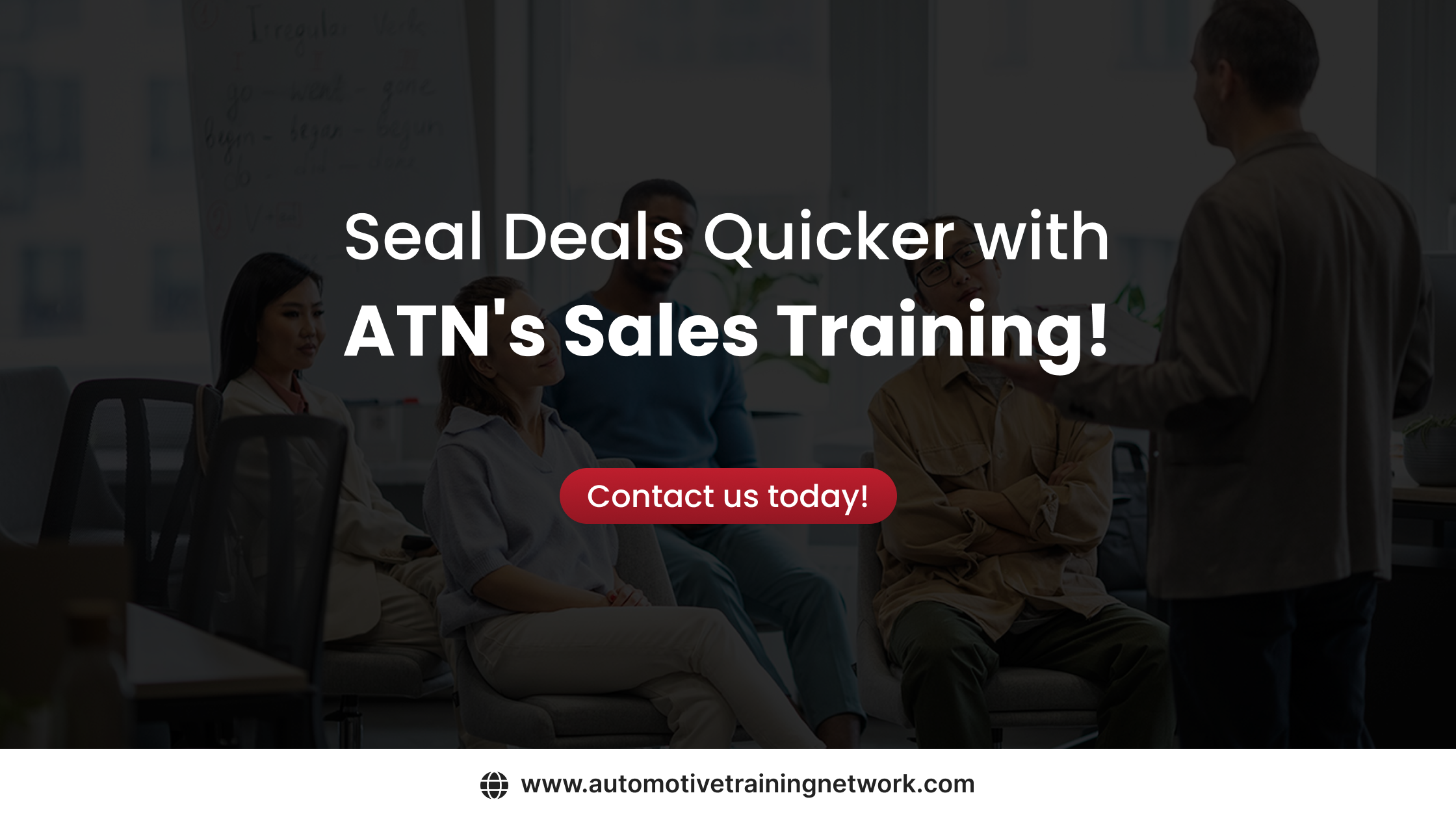Car Sales Questions to Ask Customers: Elevate Your Selling Skills

Selling cars successfully hinges on asking the right questions. For car salespeople, this means digging into what the customer really wants and needs. Good questions can uncover all sorts of important information - like the buyer’s budget, the features they can’t live without, and how soon they need a new vehicle.
By asking thoughtful and relevant questions, you position yourself as a helpful advisor rather than just a salesperson. This shift enhances customer satisfaction and sets the stage for a more enjoyable and effective sales process for both parties.
In this blog, we'll discuss the types of car sales questions to ask customers that can transform your sales approach, help you understand your customers better, and make your interactions more productive.
Types of Qualifying Questions for Car Sales
These are some of the best qualifying questions to ask a customer in car sales:
- Needs-Based Questions
These questions help determine what customers need and why they want to buy a car. When you know what a customer wants, like safety features or lots of space, you can show them cars that fit exactly that need.
- Financial Questions
Financial questions are critical to ensure the vehicles discussed meet the customer's budgetary constraints. These questions also open discussions about financing options or potential trade-ins, which can be crucial for closing a sale.
- Preference-Based Questions
These questions delve into the customer's personal tastes and brand perceptions, which can significantly influence their decision. They help salespeople understand what aspects of a vehicle are most appealing to the customer.
- Timeline Questions
Understanding the urgency of the purchase can help prioritize customers ready to buy immediately and manage expectations for delivery and availability. Some customers might be ready to purchase immediately, while others could be in the early stages of shopping around.
Top Questions a Car Salesman Should Ask Customers
Explore the different types of questions to ask a customer in car sales:
1. Meet and Greet
This initial interaction sets the tone for the entire sales process. These are some of the best questions to ask car purchasers, and they provide an opportunity to build rapport and understand the customer's needs.
- “How did you hear about us?”
This question helps gauge the effectiveness of your marketing strategies and understand which channels are bringing customers into the dealership.
- “Is this your first visit to our dealership?”
Asking if the customer has visited before allows you to tailor the customer service experience. If they are a repeat visitor, you can reconnect with previous interactions; if they are new, you can offer a warm welcome and a brief introduction to your dealership’s services and benefits.
- “What kind of cars have you owned before?”
Knowing the customer’s previous vehicles can provide insights into their preferences and any brand loyalties or dissatisfaction that might influence their current search.
2. Determining Needs
While talking to car purchasers, you need to determine their specific needs and preferences. These open-ended car sales questions provide tailored recommendations and help you close sales effectively.
- “What is the primary use of the vehicle you want to buy?”
This helps you understand whether they need a commuter vehicle, something for family use, or a vehicle suitable for off-roading or commercial purposes.
- “What features are most important to you in a new car?”
Such a question can help you get clarity on the safety features, technology like Bluetooth or GPS, or comfort elements like leather seats they are looking for.
- “Do you prefer a vehicle with higher fuel efficiency or one with more power?”
Questions like these provide a choice, making the conversation more engaging and informative.
3. Test Driving
During a test drive, car salespeople should ask questions that enhance the customer's experience and facilitate an informed buying decision. These car sales qualifying questions allow salespeople to tailor their approach to each customer's specific needs and preferences.
- “How do you find the seats? Are they comfortable and supportive enough for your back?”
Comfort is key during drives, and this question helps determine if the car meets the customer's standards for seat comfort, which is particularly important for those with long commutes.
- “What do you think about the dashboard layout and controls? Are they easy to reach and intuitive to use?”
This question gauges the ergonomic design of the car’s interior, focusing on ease of use and accessibility of features during driving.
- “Is there enough room for your needs? How about the trunk space—is it adequate?”
This checks if the vehicle fits the customer's practical needs, whether it’s accommodating family, travel gear, or shopping bags.
4. Vehicle Selection
Vehicle selection is critical as it directly impacts customer satisfaction and sales success. By asking relevant car sales qualifying questions, salespeople can accurately assess the customer's expectations and recommend ideal vehicles.
- “What specific features are you looking for in your next vehicle?”
This question helps pinpoint the customer's priorities: safety features like blind-spot monitoring, convenience features like keyless entry, or luxury features like leather seating.
- “Can you describe your typical driving conditions? Is it city, highways, or rough terrains?”
This information is crucial to recommend a vehicle with the right specifications, such as engine power, fuel efficiency, and durability.
- “Would you like a comparison of this model with others you’ve considered?”
Providing comparisons can help the customer feel they have done thorough research, leading to a more confident purchase decision.
5. Finance & Negotiation
These car sales closing questions help uncover the customer’s budget, financing preferences, and readiness to make a purchase, which are critical factors in tailoring the sales approach. By understanding financial constraints and preferences early on, salespeople can more effectively guide the customer through the buying process.
- “What's your budget for the new car?”
Starting with the budget helps immediately narrow down the car options. Knowing how much the customer can spend allows you to focus on vehicles they can afford, which makes the process more efficient.
- “Would you like to explore financing options, or are you planning to pay in full?”
Understanding whether the customer prefers to pay all at once or through a financing plan is crucial. If they're interested in financing, you can introduce them to various plans that might lower the upfront cost and make the purchase more budget-friendly.
- “What monthly payment are you comfortable with?”
Monthly payments are a critical factor for most buyers who finance their vehicles. Knowing what the customer feels comfortable paying each month helps structure a finance deal that suits their monthly budget.
Types of Car Sales Qualifying Questions to Avoid

When working in car sales, asking the right questions is as crucial as knowing which questions to avoid. Certain questions can make customers uncomfortable, seem intrusive, or even derail the sales process.
Here are some types of questions that you should generally avoid:
1. Overly Personal Questions
Avoid questions that pry too deeply into personal details irrelevant to the purchase. For example:
- "How much do you earn?"
- "What is your credit score?"
- "Why did you get divorced?"
These questions can make customers feel uncomfortable and reluctant to continue the conversation.
2. Assumptive or Leading Questions
Questions that make assumptions about the customer’s preferences, financial status, or needs can be off-putting and may lead to inaccurate conclusions. For instance:
- "You probably can't afford the high-end model, right?"
- "You wouldn’t be interested in the latest technology, would you?"
Such questions can come off as judgmental or condescending.
3. Yes or No Questions
While closed questions are sometimes necessary, relying too much on them can stifle open dialogue. Questions like:
- "Do you like this car?"
- "Is this your final decision?"
Instead, encourage more detailed responses that provide deeper insights into the customer’s preferences and needs.
4. Irrelevant Questions
Questions that do not pertain to the customer’s needs or the car buying process can distract from the main goal of understanding what the customer really wants. For example:
- "What do you think of the current political situation?"
- "Do you believe in climate change?"
Such topics can lead to unnecessary discussions that might even sour the relationship.
5. Pressure-Inducing Questions
Avoid questions that put unnecessary pressure on the customer to make a quick decision or commitment. Examples include:
- "What can I do to get you into this car today?"
- "If I give you a discount, will you buy it right now?"
Pressure tactics can create a negative buying experience and might push customers away.
By avoiding these types of questions, sales professionals can create a more positive, open, and productive environment that facilitates trust and potentially increases sales success.
Strategies to Close More Deals in Car Sales

After determining customers' needs and preferences through the right questions, it's crucial to seamlessly transition into strategies that can help close the deal effectively.
Here’s how you can enhance your closing techniques:
- Build Value Before Discussing Price
Before discussing pricing or financing, highlight the car’s key benefits, such as safety features and fuel efficiency, to show its value as a worthwhile investment.
- Create a Sense of Urgency
Mention limited-time offers or high demand for the model to encourage quick decision-making and prevent customers from walking away.
- Be Transparent and Upfront
From the start, provide clear information about pricing, fees, and financing options to build trust and avoid surprises that could derail the deal.
- Offer Multiple Options
Give customers control by presenting various financing or leasing options that cater to their financial preferences.
- Handle Objections Smoothly
Address hesitations with open-ended questions and provide reassurances that align with the customer's concerns, smoothing the path to a sale.
- Encourage Test Drives
Suggest a test drive to deepen the customer’s emotional connection to the car, making them more likely to commit to the purchase.
- Follow Up
If a deal doesn’t close immediately, send a thank you note and remind them of the car they liked to maintain engagement and open the door for further discussions.
- Close with Confidence
Summarize the car’s benefits, reaffirm its value tailored to their needs, and confidently ask for the sale, demonstrating your belief in the vehicle's suitability for them.
By integrating these strategies with the insights from initial questions, car salespeople can enhance their ability to close deals effectively and drive success in their sales careers.
Seal Deals Quicker with ATN's Sales Training!

Asking the right car sales closing questions opens the door to better sales opportunities, higher customer satisfaction, and, ultimately, a more prosperous career in car sales. Therefore, mastering this aspect of sales should be a top priority for any car salesperson aiming to excel in their field—and that is where professional training comes in.
With Automotive Training Network’s 40+ years of sales training experience, you’ll gain the expertise to excel at each stage. Our comprehensive program helps you understand and negotiate deals through virtual training, sales & BDC bootcamps, or live in-dealership training programs.
Are you ready to enhance your team’s skills and boost your conversions?
FAQs
Q1. How can I convince a customer to buy a car?
If you are wondering how to convince customers to buy a car - it involves much more than just selling; it’s about building a relationship and understanding their needs. Start by asking insightful questions to discover their specific wants, such as the type of driving they do, their must-have features, and their budget.
Tailor your approach to highlight the car's aspects that align with these needs, such as its safety features, fuel efficiency, or cutting-edge technology. Be transparent and patient, thoughtfully address any objections they have, and demonstrate the vehicle's value and suitability.
Finally, reassure them with after-sales support and warranty information to help them feel confident in their purchase.
Q2. How do I attract customers to my car sale?
Exploring how to get leads as a car salesman can involve a strategic mix of marketing and personal engagement. Start with a strong online presence; ensure your vehicles are listed on your website with high-quality photos and detailed descriptions.
Use social media to engage with potential customers by posting updates, special offers, and testimonials. Offline, participate in local events, or sponsor community activities to raise brand awareness.
Always focus on providing a memorable customer experience, from the initial contact to after-sales follow-up, to encourage referrals and repeat business. Consider offering promotions or loyalty discounts to attract new customers and keep them coming back.
